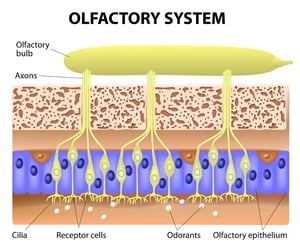Researchers from Massachusetts Eye and Ear in Boston (USA) have managed to activate the sense of smell in three volunteers with a state-of-the-art technique, using the principle of cochlear implants (microchips implanted into the inner of people with profound hearing loss in order to restore hearing, thanks to the direct stimulation of the acoustic nerve). In practice, the US researchers implanted special electrodes endoscopically into the paranasal sinuses that were able to stimulate the olfactory bulb, i.e. the area of the brain where information on smell coming from the nose is processed and then sent from there to the deepest parts of the brain. The researchers described their experiment in the scientific journal International Forum of Allergy & Rhinology. This technique, which still has to be improved, may help people that suffer from anosmia (loss of sense of smell) to restore their perception of smell.
Tested on five healthy volunteers, the implant was successful, as stated, in three out of the five, who claimed that they perceived specific smells following stimulation.
The loss of smell causes a more serious disability than what is generally thought, because the ability to perceive smell is linked to reactions of alarm and defence, but also sexual interaction, appetite and identification of the taste of food, as well as many other functions. Anosmia is often caused by a nasal obstruction (swelling, polyps, sinusitis), which can partially be cured, but at times is the result of permanent damage to the sensorial fibers of the nose, following a head injury or a viral infection, for example. In many cases, old age also leads to the gradual loss of sense of smell. According to some estimates, approximately 5 percent of the population suffers from this problem. However, with age this percentage grows significantly: around 50% of over 65s, in fact, claim to have some degree of olfactory impairment.
“There’s currently so little that we can do for these patients” said Dr. Eric Holbrook, director of rhinology at the Massachusetts Eye and Ear and associate professor of Otolaryngology at Harvard Medical School, “We hope to eventually be able to re-establish smell in people who don’t have a sense of smell. Now we know that electrical impulses to the olfactory bulb can provide a sense of smell — and that’s encouraging”.

